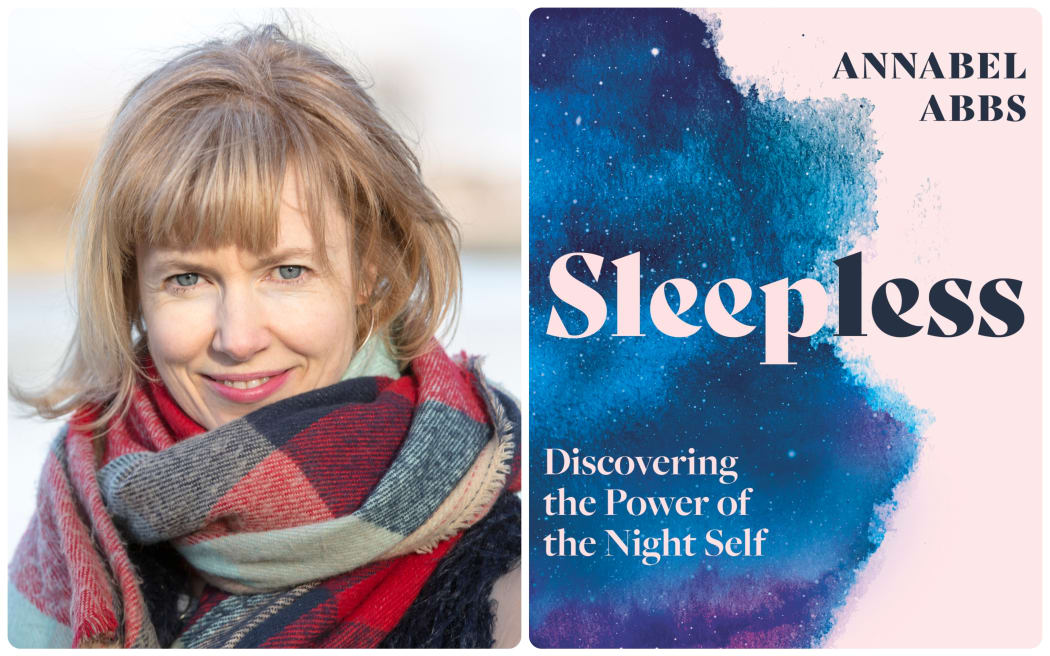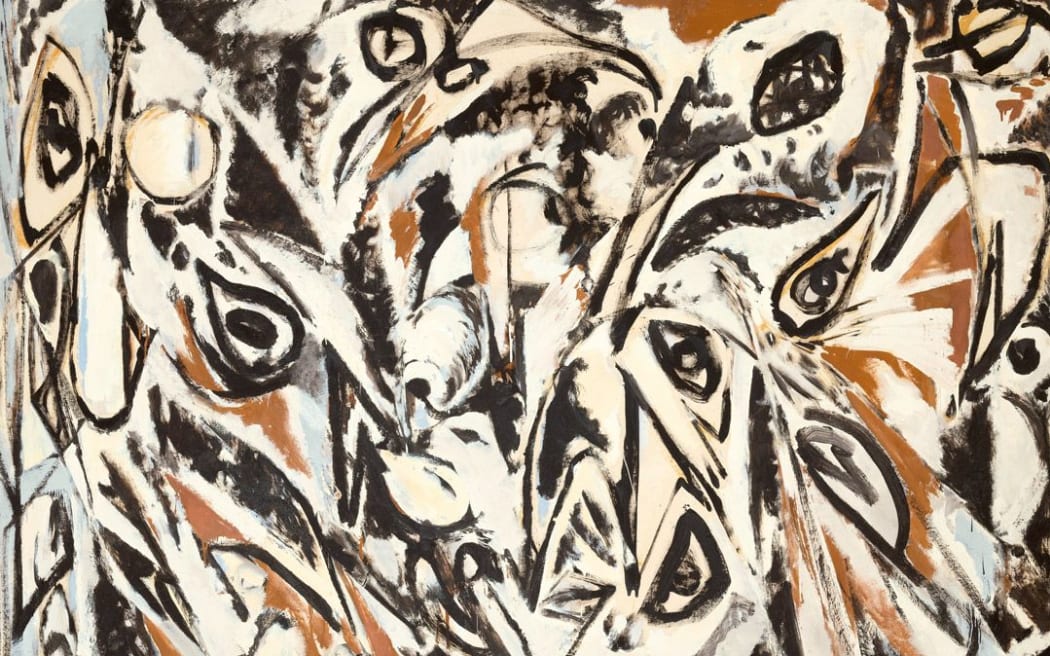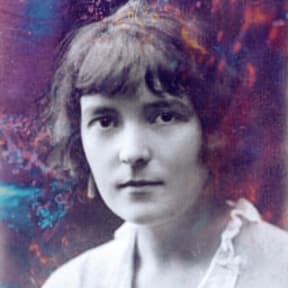Before 2020, writer Annabelle Abbs was accustomed to a bit of "gentle insomnia" every night. But after the deaths of her stepfather, father and a family puppy in quick succession, sleep became a thing of the past.
"When I realised that I was going to have perhaps months, perhaps years of being awake all night, I had two options, really - one was go to my doctor and say I desperately need sleeping pills and the other one was to just go with it," she tells The Weekend.

Photo: Supplied
In her new book Sleepless, Abbs explores insomnia as a source of inspiration and creativity for herself and other women throughout history.
After this run of losses, as the eldest daughter with a bereaved mother, a bereaved stepmother and four kids, Abbs was "manically busy," looking after others.
She says the night hours were the only available time to process her own grief.
"I think I woke up at night because I really needed that time. I needed that silence, I needed that completely undistracted time where there was no one who could ask me anything, and no one expected me to be smiley or to be handing out tissues.
"I could just lie there and try and answer all the questions that I think we all have when we lose people who were very dear to us.
"The night became my refuge really, my sanctuary. So I didn't really resent the fact that I wasn't sleeping because I needed that time I needed it to be awake."
Abbs began reading letters and journals to discover how women of the past who didn't have access to "sleeping pills or even decent mattresses and pillows" had coped with grief.
"I wanted to know how they had dealt with the darkness, how they had dealt with the aloneness, how they had dealt with this slightly different brain that I was sort of coming to terms with."
The next phase of her exploration of the sleepless women of the past was to try and do what they had done - things like writing, walking, looking at stars or drawing.
"For me, tossing and turning was incredibly stressful. I would find myself the next day, really tired and anxious from the stress.
"But I found when I was doing things at night, that the next morning even though I hadn't had probably enough sleep, I actually felt absolutely fine because I'd found something in the night that sustained me in a way."

Night Watch (1960) by Lee Krasner Photo: ©️ 2021 The Pollock-Krasner Foundation / Artists Rights Society (ARS), New York
When American painter Lee Krasner stopped sleeping at 51, she used the free hours to create a series of bold, large-scale works that she called Night Journeys.
"She painted very differently by night, she painted in a very physical way, she would jump and sort of daub and thrust the brush. And she also decided that her night paintings couldn't use any colour - that seemed all wrong to her. She just used brown and cream and variations of those. So they're just these very muted colours and they're huge, and they're beautiful and now they're her best-selling paintings. She was doing this for about two or three years.
"After that, she never painted like that again. She said that those were my night journeys and that that chapter is closed, but they were so completely different from her earlier and her later paintings and again, I thought okay, that's her 'night self' painting."

We commemorate New Zealand writer Katherine Mansfield on RNZ Concert. Photo: Creative Commons
When New Zealand writer Katherine Mansfield lay in bed awake, the waking dreams of childhood she'd have were so pleasurable that she called them the "consolation prize" for her insomnia, Abbs says.
"I love that phrase. And I would often think that to myself, you know, this, these things I'm doing, these poems I'm writing … this is the consolation prize for my grief and my own insomnia.
"It was a huge distraction from the lying awake and grieving, the mind going round and round and round and often not really getting anywhere. That ruminative night brain, which is a real thing...
"I didn't want to do that, I wanted to find the upside if you like, I wanted to find a new way, I wanted to reconnect with night in a much more positive way. And I had a suspicion that if I could just feel comfortable with the darkness and with the night and with the aloneness of it, that actually that would soothe me and I would eventually fall back to sleep, which eventually I did. So it was also a route back to a more normal way of sleeping for me."
Abbs still loves to go night walking when she isn't sleeping.
"I became fascinated by the stars so I would go out and I would just walk around the fields. There were no predators there and I would take a big stick, I would just look at the stars and feel the night air. It was just so beautiful and calm, just looking up at the stars ... Studies now show that that is something that calms us, it lowers our blood pressure, it lowers our heart rate."
Abbs also turned to science to try and understand why our brains seem to be wired so differently at night, including the recent ground-breaking study The Mind After Midnight.
She was happy to discover that the worrying headlines which say "If you don't get eight hours of perfect sleep you're at much greater risk of heart disease and obesity and dementia and death" are not accurate.
"I started to dig into quite a lot of studies and those were really reassuring for me because without those, I think I probably would have just carried on lying there trying to get back to sleep.
"Those studies told me that actually it's fine, we all have different amounts of sleep that we need.
"The most important sleep hours are the first few hours you get right at the beginning, that's when you have your deepest sleep and your body restores itself."
Abbs also learned that there are different ways of coping with tiredness after a sleepless night - a brisk walk in the light can be as good for your brain as taking a nap, for example.
She was quite comforted to learn that women are likely better adapted to broken sleep than men and less likely to suffer physiologically from it.
"That also I found very reassuring because when I've been looking through the journals and diaries of all of these women of the past, none of them had really slept very well. And yet, they all seem to survive without dementia and go on, often to into quite a ripe old age."
At night, our thinking can feel disordered because when the rational and logical parts of the brain shut down for the night, the other bits "sort of come out and play".
"The other side of that is that it's a little bit more creative, we're perhaps thinking a little bit more out of the box because we're not thinking down those straight lines.
"But also for women who have a bigger and more active prefrontal cortex, when that closes down, the inner critic - that I think we have a little bit more of - also goes to sleep.
"I certainly found with what I was doing at night that I was far less judgmental of it ... I didn't keep thinking, Oh, that's terrible, which of course, during the day, I'd be 'That's terrible. You can't do that'. But at night it just felt that the inner critic seemed to have gone to sleep for a bit and I quite liked that freedom."
Abbs still wakes up at night quite often. She likes to go downstairs and light a candle, maybe do some writing, look out the window or go for a walk then return to bed.
"Quite miraculously, I sort of just go back to sleep. It's rather nice."
She now knows it's completely normal to wake up in the night and it's a time when women can actually find some "real joy".
"Think about all the people of the past who were awake. Maybe you don't want to get up and do an oil painting but just think about all the people who did and how they survived and had fantastic art shows.
"It's a really good time to try something that you wouldn't normally do. And never ever worry about the following day 'cause it's always fine."

